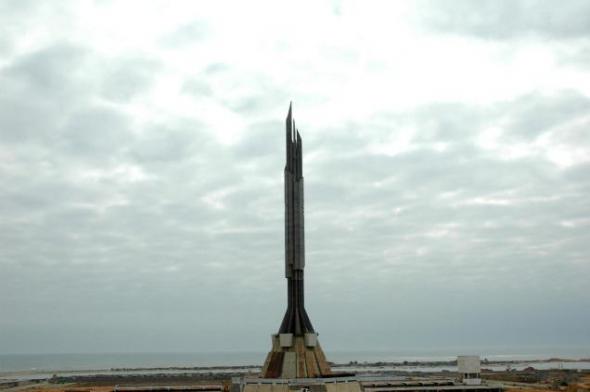 Artist Kiluanji Kia Henda photographed iconic structures around Luanda and recast them as components of an imaginary space programme. Here the mausoleum of Angola's first President Antonio Agostinho Neto is described as spaceship Icarus 13. Photo courtesy Galleria Fonti Naples
Artist Kiluanji Kia Henda photographed iconic structures around Luanda and recast them as components of an imaginary space programme. Here the mausoleum of Angola's first President Antonio Agostinho Neto is described as spaceship Icarus 13. Photo courtesy Galleria Fonti Naples
The space shuttle Icarus 13, with its slender spires and massive flared base, is parked by the seafront a few blocks from downtown Luanda, the capital of Angola. But the shuttle will never leave the oil-rich west African country for the weightless serenity of space — Icarus 13 is not really a space ship, it is a mausoleum, an art project, a constructivist gesture in concrete. “My idea for ‘Icarus13’ has a lot to do with the idea of celebration, but at the same time, the failure of many post-independent African nations,” wrote Kiluanji Kia Henda, the Angolan artist behind Icarus 13, in an e-mail. Mr. Kia Henda took photographs of iconic buildings around Luanda and recast them as components of an utterly imaginary pan-African space mission: an abandoned building was photographed to look like an astronomy observatory; the Soviet-funded mausoleum of Antonio Agostinho Neto, Angola’s first President and Kremlin ally, became “Icarus 13” — a spaceship that would take an all-African crew on a fantastical journey to the sun. “The misery of many African societies forces us to be submitted on the present and basic issues,” said Mr. Kia Henda. “For me it is also important to find a new approach on the reading of African contemporary creation.” Last week, a gathering of Communication Ministers in Khartoum considered a proposal not dissimilar from Mr. Kia Henda’s art: if realised, Afrispace will be a pan-African space agency committed to “promote, for exclusively peaceful purposes, cooperation among African states in space research.” The announcement triggered a wave of chatter on social networks with many, predominantly western, commentators implying that African governments could better serve their citizens by investing in anti-poverty measures. Yet, much like Mr. Kia Henda’s art, the continent’s policymakers believe they must think beyond the immediacy of the present and support transformational technology. “A pan-African space programme that is well aligned to bring immense benefit to the needs on the continent will have significant economic impact,” said Vanashree Maharaj, spokesperson for the South African National Space Agency (Sansa), adding that countries too poor to invest in space technologies would benefit from access to satellite data to improve environmental resource and disaster management, and could contribute to scientific knowledge. Apart from the absence of the sort of detailed geological and climatic data that satellites could provide, African nations are also hamstrung by some of the world’s most expensive yet rudimentary telecommunication infrastructure. At present, the entire continent has less bandwidth than Norway; almost all of which comes from 20-odd communication satellites, positioned over Africa, that are owned by non-African companies. “Space technologies…provide commercial opportunities and strategic advantages for a tiny minority of countries controlling them,” claims an Afrispace working paper. Space technologies can be divided into the rocket science needed to put a satellite in space, and the earth station know-how necessary to make full use of the satellite once it is in orbit. “No African nation has the ability to launch a satellite even though Africa has a massive advantage having land on the equator, meaning lower costs for getting into orbit,” said Brad Inggs, CEO of Orbital Horizon, a South African company investing in commercial space flight and space advocacy. Launching from equatorial sites, Mr. Inggs said, could result in fuel savings of up to 25 per cent when compared to launch-pads further north. At present, countries like Ghana, South Africa, and Nigeria are investing in ground stations rather than rockets. While Ghana has set up the Ghana Space and Technology Centre that hopes to become a regional focal point for remote sensing, meteorological and communication technologies, Nigeria launched three satellites last year. The NigComSat-1R communication satellite was built with Chinese support, while a British company built the NigeriaSat-2 and NigeriaSat-X imaging satellites. All three were launched from foreign launch pads. Rather than each country investing in its own programmes, Michael Afful, spokesperson for Ghana’s Space Generation Advisory Council, believes that a pan-African approach “will allow for the sharing of risks and costs and ensure the availability of skilled and sufficient human resources. It will also ensure a critical size of geographical area and population required … for some space applications.” Yet, the greatest obstacles to Afrispace could be political and institutional rather than technological, says Chandrashekar Srinivasan who worked at the Indian Space Research Organisation (ISRO) at a time when many questioned the premise of a developing country like India investing in space research. “A number of detailed cost benefit studies have indicated that the benefits of the [Indian space] programme far outweigh the costs,” said Prof. Chandrashekar, now a Professor of Corporate Strategy and Policy at the Indian Institute of Management in Bangalore. “Africa as a whole is a viable entity for a space programme, [but] it is difficult to get a group of countries at different stages of development and with different capabilities and internal needs to work together.” While a lot of the technology can now be bought off the shelf rather than built from scratch, Prof. Chandrashekar believes the interface between technology and good governance is the most critical infrastructure. “This aspect is pretty bad even in India today,” he said. If it is to succeed, Afrispace must build institutions to leverage scientific infrastructure into development gains, or metaphorically risk becoming a mausoleum like Icarus 13.
From The Hindu

